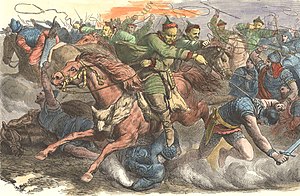355
Appearance
This article needs additional citations for verification. (November 2017) |
| Millennium: | 1st millennium |
|---|---|
| Centuries: | |
| Decades: | |
| Years: |
| 355 by topic |
|---|
| Leaders |
| Categories |
| Gregorian calendar | 355 CCCLV |
| Ab urbe condita | 1108 |
| Assyrian calendar | 5105 |
| Balinese saka calendar | 276–277 |
| Bengali calendar | −238 |
| Berber calendar | 1305 |
| Buddhist calendar | 899 |
| Burmese calendar | −283 |
| Byzantine calendar | 5863–5864 |
| Chinese calendar | 甲寅年 (Wood Tiger) 3052 or 2845 — to — 乙卯年 (Wood Rabbit) 3053 or 2846 |
| Coptic calendar | 71–72 |
| Discordian calendar | 1521 |
| Ethiopian calendar | 347–348 |
| Hebrew calendar | 4115–4116 |
| Hindu calendars | |
| - Vikram Samvat | 411–412 |
| - Shaka Samvat | 276–277 |
| - Kali Yuga | 3455–3456 |
| Holocene calendar | 10355 |
| Iranian calendar | 267 BP – 266 BP |
| Islamic calendar | 275 BH – 274 BH |
| Javanese calendar | 237–238 |
| Julian calendar | 355 CCCLV |
| Korean calendar | 2688 |
| Minguo calendar | 1557 before ROC 民前1557年 |
| Nanakshahi calendar | −1113 |
| Seleucid era | 666/667 AG |
| Thai solar calendar | 897–898 |
| Tibetan calendar | 阳木虎年 (male Wood-Tiger) 481 or 100 or −672 — to — 阴木兔年 (female Wood-Rabbit) 482 or 101 or −671 |

Year 355 (CCCLV) was a common year starting on Sunday of the Julian calendar. At the time, it was known as the Year of the Consulship of Arbitio and Maesius (or, less frequently, year 1108 Ab urbe condita). The denomination 355 for this year has been used since the early medieval period, when the Anno Domini calendar era became the prevalent method in Europe for naming years.
Events
[edit]By place
[edit]Roman Empire
[edit]- January 1 – Arbitio and Lollianus Mavortius begin their term as Roman consuls.[1][2]
- August 11 – Claudius Silvanus, accused of treason, proclaims himself Roman Emperor.[3] After 28 days, Ursicinus arrives from Rome and has Silvanus murdered.
- November 6 – In Mediolanum (Italy), Emperor Constantius II raises his cousin Julian the Apostate to the rank of Caesar.[4] He takes command of the western provinces and marries Constantius' sister, Helena.
Europe
[edit]- The Lentienses, a Germanic tribe, are fined by the Roman commander Arbetio under Constantius II for several incursions against the Roman Empire.
- The Franks besiege Colonia Agrippinensium for ten months.
Asia
[edit]- The Huns of Central Asia begin their great drive westwards with an advance into Scythia (modern Russia). They overcome and absorb the Alans, a nomadic and warlike horse breeding people from the steppes northeast of the Black Sea. [citation needed]
By topic
[edit]Religion
[edit]- Pope Liberius refuses to sign a condemnation of Athanasius, Patriarch of Alexandria, imposed at Milan by Constantius II. Liberius is exiled to Beroea (Greece) and replaced by Felix II. He becomes an antipope and bishop of Rome.
Births
[edit]- Fan Tai, Chinese general of the Jin Dynasty (d. 428)
- Murong Bao, Chinese emperor of Later Yan (d. 398)
Deaths
[edit]- September 7 – Claudius Silvanus, Roman usurper
- Aedesius, Roman Neoplatonist philosopher and mystic[5]
- Fu Jian, Chinese emperor of the Former Qin (b. 317)[6]
- Liang, Chinese empress of the Former Qin Dynasty
- Zhang Yaoling, Chinese ruler of Former Liang (b. 344)
- Zhang Zuo (or Taibo), Chinese ruler of Former Liang
References
[edit]- ^ E.J. Bickerman, Chronology of the Ancient World (Ithaca: Cornell University Press, 1968), p. 64
- ^ Timothy David Barnes (1981). Constantine and Eusebius. Harvard University Press. p. 399. ISBN 978-0-674-16531-1.
- ^ Ammianus Marcellinus, History, 15.2.3.
- ^ Kopff, E Christian; Perowne, Stewart Henry. "Julian". Encyclopædia Britannica. Retrieved February 24, 2024.
- ^ Henry Fynes Clinton (1845). Fasti Romani: Tables. University Press. pp. 363.
- ^ Jennifer Holmgren (1982). Annals of Tai: Early T'O-Pa History According to the First Chapter of the Wei-Shu. Faculty of Asian Studies. p. 91. ISBN 978-0-909879-16-7.
